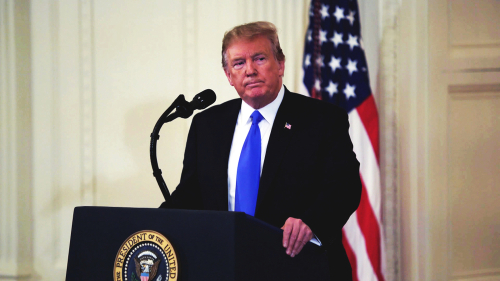
The United States Supreme Court is currently engaged in a pivotal case that could have far-reaching implications for the future of American politics. The central question before the justices is whether former President Donald Trump should be barred from running for office and consequently removed from the 2024 Colorado ballot. This unprecedented legal challenge hinges on a Civil War-era constitutional provision, raising questions about its relevance in today’s political landscape.
On December 19th, a decision was made to declare Trump ineligible to appear on the Colorado ballot, marking the first time in history that Section 3 of the 14th Amendment, often referred to as the insurrection clause, has been invoked to disqualify a presidential candidate. The Supreme Court’s review of this decision is not only rapid but carries significant weight as it will set a historical precedent.
🚨 SUPREME COURT BARRICADED AHEAD OF SCOTUS REVIEW OF TRUMP BALLOT REMOVAL CASE TODAY🚨
Anti-Trump protesters have arrived outside of the United States Supreme Court this morning. They can be seen in this video shouting “TRUMP IS A TRAITOR” at the lawyers as they walked into the… pic.twitter.com/QgHZmWtohN
— Laura Loomer (@LauraLoomer) February 8, 2024
The 14th Amendment, ratified in 1868, includes a clause that prohibits individuals who have engaged in insurrection or rebellion against the United States from holding federal office. The application of this amendment to Trump’s candidacy stems from the events of January 6th, when a group of his supporters stormed the Capitol in an effort to protest the 2020 election results.
The Supreme Court’s deliberation comes at a critical juncture, with the Republican primaries fast approaching on March 5th. Voters in 15 states, including Colorado, are preparing to cast their ballots, and the outcome of this case will determine whether Trump’s name will be among the choices. The urgency of the situation is palpable, as the court is under pressure to reach a decision swiftly.
Hillary Clinton (@HillaryClinton) who was defeated by Donald Trump in 2016 and has never recovered, again, viciously attacked the person who defeated her in an interview yesterday and even advised the Supreme Court to rule against him. WATCHpic.twitter.com/CFzKUnL4d4
— Simon Ateba (@simonateba) February 8, 2024
Trump, at 77, remains a formidable figure in American politics and is widely considered the likely frontrunner to challenge incumbent President Joe Biden, who is 81, in the upcoming general presidential election in November. The possibility of his removal from the ballot has sparked intense debate and speculation about the future direction of the Republican Party and the political dynamics of the upcoming election.
Both sides of the argument are delving into historical records to bolster their cases, examining how the insurrection clause was interpreted at the time of its adoption. Proponents of Trump’s disqualification argue that the clause clearly applies to his actions surrounding the January 6th events, while his defenders assert that such a move would be an overreach and misuse of the constitutional provision.
The Supreme Court’s decision will not only affect Trump’s political fate but also serve as a litmus test for the Constitution’s enduring strength and adaptability. It will address whether historical clauses can be applied to contemporary issues and if they serve the purpose of safeguarding the nation’s democratic principles.
As the nation awaits the Supreme Court’s ruling, the tension is palpable across the political spectrum. The outcome of this case will undoubtedly shape the trajectory of American democracy and define the boundaries of accountability for those who seek the highest office in the land. The eyes of the nation are fixed on the Supreme Court, as it contemplates a decision that will echo through the annals of American history.









